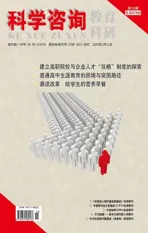译者主体性在翻译中的体现—以葛浩文英译《红高粱家族》为例
2020-01-08裴舒芸
裴舒芸
(天津农学院 天津 300000)
葛浩文在翻译《红高粱家族》的过程中,充分发挥了译者主体性,在尽量忠实原文的前提下,进行了适度改写,以提高译文的可读性和可接受性。[1]译者主体性在《红高粱家族》翻译过程中主要体现在以下几方面:
一、对语言进行适度简化处理,降低译作难度,增强可读性
例1:爷爷他们走在街上听到人们的唧唧低语声,便昂首挺胸,竭力想表现出英雄气概,心里却七上八下,忐忑不安,沉重的忧虑像石头一样压在每个人心头。
译文:When Granddad and the others heard whispers from the crowd, they raised their heads and thrust out their chests, wanting to leave a gallant impression.Deep down, however, they were worried.
此处描写的是主人公“我爷爷”余占鳌做杠夫时,在綦翰林家抬水银棺材时的心情,原著使用了一些四字成语和隐喻,如“心上八下”“忐忑不安”“像石头一样压在每个人心头”。而译文仅用“worried”一词来表现主人公的忧虑,反映出葛浩文译文对词汇采用了简化的方式。一方面,使译文易读易懂;另一方面,简洁不重复的表达,也更契合西方读者的审美需求。
例2:一轮明月冉冉升起,遍地高粱肃然默立,高粱穗子浸在月光里,像蘸过水银,汩汩生辉。
译文:A bright round moon climbed slowly in the sky above the solemn, silent sorghum fields, bathing the tassels in its light until they shimmered like mercury.
原文中,莫言使用了一些具有中国古典韵味的词汇,如“冉冉升起”“汩汩生辉”。为了便于译文读者理解,葛浩文采用了意译或释义的译法,用“climbed slowly”和“shimmered”进行翻译,经过简化处理,降低了外国读者的阅读难度。[2]
二、在文中增加解释性信息,以便于读者理解
例1:你简直是鲁班门前抢大斧,关爷面前耍大刀,孔夫子面前背《三字经》,李时珍耳边念《药性赋》,给我拿下啦!
译文: You schemed to manipulate the local government and deceive me, like someone wielding an ax at the door of master carpenter Lu Ban, or waving his sword at the door of the swordsman Lord Guan,or reciting the Three Character Classic at the door of the wise Confucius, or whispering the Phapsody on the Nature of Medicine in the ear of the physician Li Shizhen.
对于“鲁班”“关爷”“孔夫子”“李时珍”等富含中国文化背景的词汇,若译者仅译名字,而不加注释的话,外国读者对这些人物一无所知,会阻碍读者的理解。因此,葛浩文选择直译加文内注释的方法进行解释和说明,在每个人名前添加最简洁的文字介绍其身份。这样,既帮助西方读者更深入地理解原文,也保证了读者阅读的流畅性。
例2:那天是清明节,桃红柳绿,细雨霏霏,人面桃花,女儿解放。
译文:It was Qingming, the day set aside to attend ancestral graves, peach trees were in full bloom, willows were green, a fine rain was falling, and the girls’ faces looked like peach blossoms.It was a day of freedom for them.
清明节是中国传统节日,是中国人扫墓祭祖的日子。大多数西方读者对这个节日非常陌生。鉴于此,葛浩文此处采用增译法进行补充,最大限度保留了原文的文化印迹。
三、对容易引起意识形态冲突的细节进行改写或者省译
例1:长大后努力学习马克思主义,我终于悟到:高密东北乡无疑是地球上最美丽最丑陋、最超脱最世俗、最圣洁最龌龊、最英雄好汉最王八蛋、最能喝酒最能爱的地方。
I didn’t realize until I’d grown up that Northeast Gaomi Township is easily the most beautiful and most repulsive, most unusual and most common, most sacred and most corrupt, most heroic and most bastardly,hardest-drinking and hardest-loving place in the world.
葛浩文在翻译此处时省去“马克思主义”,使这句中的政治色彩被巧妙地消除,回避了因中西方意识形态差异而导致读者在阅读时可能产生的抵触情绪。[3]
四、遇到文化碰撞时,会按照西方读者的文化心理与审美取向,处理各种语言和文化问题
例1:“大哥大哥大哥,太君让我干,我不敢不干……你死后升了天,骑白马,配雕鞍,穿蟒袍,坠金鞭……”
“Elder brother elder brother elder brother,Commander made me do it, couldn’t help myself…you exist in heaven, where you ride a white horse on a carved saddle, wear fine clothes, carry a golden whip…”
原文的“升天”,在中国道教文化中,指人得道成神成仙以后生活的世界,这有别于基督教中的“天堂”(heaven)。但为了让译入语读者理解原文,葛浩文用“exist in heaven”来译“升了天”。这是因为西方人大多信基督教,选用一个大多数读者熟悉的宗教词汇,更容易让目标语读者理解和接受。
从以上例证可以看出,译者葛浩文在从事翻译活动时,通过对原作进行一定程度的改写,以使其符合译者所处社会主流意识形态和审美需求,以达到译作被尽可能多的读者接受的目的。
